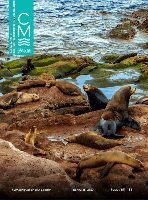
CIENCIAS MARINAS
Scope & Guideline
Advancing Marine Science Through Open Access
Introduction
Aims and Scopes
- Marine Ecology and Biodiversity:
Research on the interactions and relationships among marine organisms, their habitats, and their environments, emphasizing biodiversity assessments and ecological dynamics. - Aquaculture and Fisheries Management:
Studies focusing on the cultivation of marine organisms and the management of fisheries, including assessments of stock status, sustainable practices, and impacts of environmental changes. - Environmental Monitoring and Assessment:
Utilization of biological indicators and environmental data to assess the health of marine ecosystems, including the impacts of anthropogenic activities. - Marine Biotechnology:
Exploration of the biotechnological potential of marine organisms, including the study of bioactive compounds, microbial communities, and applications in various industries. - Climate Change and Oceanography:
Research examining the effects of climate change on marine environments, including oceanographic processes, temperature variations, and their impacts on marine life.
Trending and Emerging
- Microbial Ecology and Biotechnological Applications:
An increasing number of studies focus on microbial communities in marine environments, exploring their ecological roles and potential applications in biotechnology, reflecting a growing interest in microbial diversity. - Impact of Climate Change on Marine Species:
Research investigating the effects of climate change on species distribution, reproductive patterns, and ecosystem dynamics has surged, highlighting the urgent need for understanding and mitigating these impacts. - Anthropogenic Effects on Marine Environments:
There is a rising trend in studies assessing the impact of human activities, such as pollution and habitat modification, on marine ecosystems, emphasizing the importance of sustainable management practices. - Marine Protected Areas and Conservation Strategies:
Emerging research on the effectiveness of marine protected areas and innovative conservation strategies showcases a shift towards proactive management of marine resources. - Innovative Aquaculture Techniques:
Studies exploring new aquaculture methods and species diversification are gaining traction, reflecting the need for sustainable practices in response to global food demands.
Declining or Waning
- Traditional Marine Conservation Practices:
There has been a noticeable decrease in studies focused solely on traditional marine conservation methods, possibly due to the shift towards integrated, multidisciplinary approaches that consider socio-economic factors. - Invasive Species Studies:
Research on invasive marine species, while still important, appears to be published less frequently, indicating a possible shift in focus towards more immediate environmental impacts and restoration efforts. - Historical Marine Research:
Themes related to historical baselines and comparisons of marine ecosystems over time are less prevalent, potentially overshadowed by urgent contemporary issues such as climate change and habitat degradation.
Similar Journals

MARINE AND FRESHWATER RESEARCH
Exploring the depths of aquatic ecosystems.Marine and Freshwater Research is a prestigious journal published by CSIRO PUBLISHING that serves as a key platform for the dissemination of cutting-edge research in the fields of Aquatic Science, Ecology, and Oceanography. With an impactful presence since its inception in 1948, the journal provides critical insights into the dynamics of freshwater and marine ecosystems, promoting interdisciplinary approaches that contribute to our understanding of biodiversity and sustainability. Currently ranked in the Q2 category across major scientific domains, including Ecology and Aquatic Science, it enjoys a robust academic reputation supported by impressive Scopus rankings, such as Rank #66/247 in Aquatic Science and Rank #44/145 in Oceanography, reflecting its high citation impact and relevance. While offering a subscription-based access model, the journal remains dedicated to fostering dialogue and innovation within the scientific community, aiming to bridge the gap between research findings and practical applications in environmental management. Located in Australia, Marine and Freshwater Research is an essential resource for researchers, professionals, and students dedicated to exploring the complexities of aquatic ecosystems and advocating for their preservation.

Journal of Ocean University of China
Fostering Collaboration in Oceanic ExplorationThe Journal of Ocean University of China, ISSN 1672-5182, is a premier academic journal dedicated to advancing the fields of Ocean Engineering and Oceanography. Published by the esteemed Ocean University of China, the journal serves as a vital platform for researchers, professionals, and students to disseminate groundbreaking findings and foster collaboration in marine science and engineering. With a commitment to quality, the journal currently holds a Q3 ranking in both Ocean Engineering and Oceanography as of 2023, indicating its significant contributions within the scientific community. The journal's scope encompasses a wide range of topics including marine technology, ecological studies, and coastal management, all aimed at enhancing the understanding and utilization of oceanic resources. Although currently not Open Access, it continues to attract submissions from renowned scholars, ensuring a diverse and innovative range of research. By providing access to cutting-edge research and practical insights, the Journal of Ocean University of China plays a critical role in shaping the future of ocean sciences and engineering.

Latin American Journal of Aquatic Research
Advancing Aquatic Knowledge for a Sustainable FutureLatin American Journal of Aquatic Research (ISSN: 0718-560X) is a distinguished scholarly publication that has been paving the way for aquatic science research since its transition to Open Access in 2008, allowing unhindered access to diverse scientific inquiries conducted in Latin America and beyond. Published by Pontificia Universidad Catolica de Valparaiso in Chile, this journal serves as a vital platform for researchers and practitioners in the fields of Aquatic Science and Oceanography. With an esteemed Q3 ranking in both categories as of 2023, it is dedicated to disseminating high-quality research findings that address pressing ecological and biological challenges. The journal’s reach and impact are reflected in its Scopus rankings, where it stands at the 36th percentile in Oceanography and the 35th percentile in Aquatic Science. Researchers, professionals, and students alike will find valuable insights and data-driven articles that further the understanding of aquatic ecosystems, making it an essential resource for ongoing studies and future innovations.
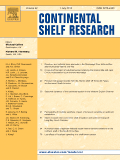
CONTINENTAL SHELF RESEARCH
Innovating Understanding of Marine Resources and ProcessesCONTINENTAL SHELF RESEARCH, published by PERGAMON-ELSEVIER SCIENCE LTD, is an esteemed journal within the fields of Aquatic Science, Geology, and Oceanography, reflecting a compelling intersection of these disciplines. Since its inception in 1982, this journal has served as a premier platform for disseminating cutting-edge research relevant to the continental shelf ecosystem, including its geological features, biological resources, and physical processes. With a Category Quartile ranking of Q1 in Aquatic Science and prominent Q2 standings in Geology and Oceanography, it is recognized for its rigorous peer-review standards and impactful contributions, evidenced by its respective rankings in Scopus. Researchers and professionals are encouraged to engage with the journal's array of high-quality articles that not only enhance scientific understanding but also inform policy and conservation efforts. This dedication to advancing knowledge makes CONTINENTAL SHELF RESEARCH an essential resource for those passionate about marine and coastal studies in the United Kingdom and globally.
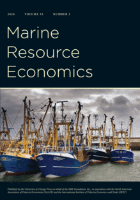
Marine Resource Economics
Connecting Economics with Ocean ConservationMarine Resource Economics is a premier journal published by University of Chicago Press, dedicated to the intersection of marine resource management and economics. With an ISSN of 0738-1360 and an E-ISSN of 2334-5985, this journal has established itself as an influential platform for scholarly discourse since its inception, covering comprehensive research from 1987 and persistently evolving up to 2024. It holds a commendable position in the 2023 category quartiles, ranking Q2 across various disciplines such as Economics and Econometrics, Geography, Planning and Development, Management, Monitoring, Policy and Law, and Oceanography. The journal's robust impact is further highlighted by its impressive Scopus rankings, boasting a 74th percentile in Geography and Planning, and a 67th percentile in Oceanography, among others. Although it operates under a subscription model, Marine Resource Economics is invaluable for researchers, professionals, and students interested in sustainable management practices and the socioeconomic aspects of marine resources, offering insights that inform policy and strategic decision-making in this critical field.

ACTA ADRIATICA
Advancing knowledge of the Adriatic Sea and beyond.ACTA ADRIATICA is a distinguished journal dedicated to the field of oceanography, published by the renowned INST OCEANOGRAFIJU I RIBARSTVO in Croatia. With its ISSN 0001-5113 and E-ISSN 1846-0453, this journal offers a rigorous platform for researchers and practitioners to explore and disseminate critical studies related to the Adriatic Sea and broader marine environments. Despite its categorization in Q4 of Oceanography and a current rank of #98/145 in the Scopus database, ACTA ADRIATICA remains a vital source of knowledge, fostering collaboration and innovation among ocean scientists. The journal invites submissions that contribute to understanding marine ecosystems, biodiversity, and the impacts of climate change, making it an essential resource for advancing research in this ever-evolving discipline. With a publication history extending back to 1973, ACTA ADRIATICA continues to uphold its commitment to enhancing oceanographic literature while promoting open dialogue within the scientific community.

Research in Marine Sciences
Empowering marine science for a healthier planet.Research in Marine Sciences, ISSN 2538-5542, is a leading journal published by ARMAN DARYA INC, specializing in the dynamic and interdisciplinary field of marine science. With a commitment to advancing knowledge in areas such as marine ecology, oceanography, and marine conservation, this journal provides a collaborative platform for researchers, professionals, and students to disseminate their findings. Although it operates under a traditional subscription model, the journal ensures that the latest research is accessible to a wide audience, promoting the understanding of marine environments crucial for biodiversity and sustainability. The journal aims to bridge the gap between theoretical research and practical applications, emphasizing the need for rigorous studies that address pressing marine issues in a rapidly changing world. By contributing to the body of literature in marine sciences, Research in Marine Sciences plays a vital role in shaping the future of marine research and policy-making.
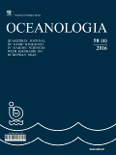
OCEANOLOGIA
Pioneering Insights in Ocean EngineeringOCEANOLOGIA, a distinguished academic journal published by the Polish Academy of Sciences, Institute of Oceanology, serves as a pivotal platform for researchers and professionals in the fields of Aquatic Science, Oceanography, and Ocean Engineering. Established in 1973 and transitioning to Open Access in 2011, this peer-reviewed journal promotes the dissemination of high-quality research across its diverse scope of ocean-related topics, aligning with its commitment to advancing marine science. With a notable impact factor underscored by its positioning in the Q1 and Q2 quartiles of recognized categories, OCEANOLOGIA stands out with impressive Scopus Rankings, including 49/247 in Aquatic Science and 24/105 in Ocean Engineering, reflecting its significance in the global research landscape. The journal's dedication to publishing cutting-edge studies ensures that it continues to influence both academic discourse and practical applications in ocean-related fields, making it an essential resource for students, researchers, and professionals aiming to contribute to the advancement of oceanic studies.
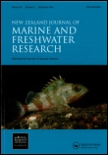
NEW ZEALAND JOURNAL OF MARINE AND FRESHWATER RESEARCH
Diving Deep into the Science of Aquatic EnvironmentsNEW ZEALAND JOURNAL OF MARINE AND FRESHWATER RESEARCH, published by Taylor & Francis Ltd, stands as a distinguished platform for the dissemination of innovative research in the realms of aquatic science and ecology. With an ISSN of 0028-8330 and E-ISSN 1175-8805, this journal has been curating significant scientific contributions since its inception in 1967, continuing through to 2024. Recognized in the Q2 category across multiple relevant fields—including Aquatic Science, Ecology, and Water Science—this journal ranks notably in Scopus, with a 74th percentile for Ecology, Evolution, Behavior and Systematics, highlighting its impact and relevance within the scientific community. Though not an open-access publication, its rigorous peer-reviewed articles offer insights that resonate with researchers, professionals, and students who are passionate about advancing our understanding of freshwater and marine ecosystems. By fostering a collaborative space for ecological and environmental inquiries, the NEW ZEALAND JOURNAL OF MARINE AND FRESHWATER RESEARCH is essential for those aiming to contribute to the vital conversations around biodiversity, conservation, and sustainable management of aquatic resources.

REVMAR-Revista Ciencias Marinas y Costeras
Advancing marine knowledge for a sustainable future.REVMAR-Revista Ciencias Marinas y Costeras is an esteemed open-access journal published by the Universidad Nacional, Facultad de Ciencias Exactas y Naturales in Costa Rica. Since its establishment, it has focused on disseminating high-quality research in the fields of Marine and Coastal Sciences, contributing significantly to the understanding of aquatic ecosystems and their conservation. With a commitment to academic excellence, the journal has been continuously accessible since 2009, allowing researchers from around the globe to share findings without barriers. Although it holds a Q4 ranking in several key categories including Animal Science, Aquatic Science, and Ecology, the journal provides a vital platform for scholars at all stages of their careers to contribute to important dialogues surrounding marine biodiversity and environmental sustainability. As it enters a period of convergence from 2019 to 2024, REVMAR aims to enhance its visibility and impact within the scientific community while maintaining a focus on innovative research that addresses pressing ecological challenges faced by marine and coastal environments.